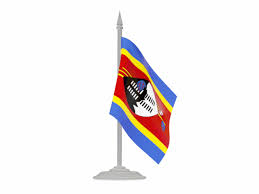"Nalo lilahle kubo" (A fireball is coming your way) Minister Maseko threatens public service workers pursuing their trade union and workers rights
Minister of Public Service Mabulala Maseko publicly threatens the expulsion public threat against public service workers fighting for their rights
Fundizwi Sikhondze
eSwatini Public Services Minister Mabulala Maseko (L), The eSwatini Flag (R).
The eSwatini Minister of Public Service Mabulala Maseko today (Tuesday 14th December 2021) issued a threat to public servants who seek to exercise their trade union and workers rights to fight for a salary review from the government of eSwatini. The Minister was speaking on the national radio station during the morning current affairs programme "Letishisako".
Maseko accused civil servants of having joined the fight for political parties and has asked them to leave the public service if they want to pursue political party related matters. The Minister promised to take drastic measures (nalo lilahle kubo or A fireball is coming their way) against civil servants who they (as government) suspect to be members of political organisation.
The rant by Minister Maseko comes as the Mbabane City Council was reported on Monday 13th December 2021 to have refused civil servants permission to march in the city in line with a directive that was issued by Minister Prince Simelane banning City Councils from issuing protest permissions of any kind in October 2021.
Since the October protest wherein the government violently dispersed public sector workers, injuring tens of them and killing at least one in Mbabane, the government has taken steps to threaten Public Services Associations (PSAs) with derecognition, wherein the government would revoke recognition agreements with the PSAs, creating chaos for workers in the public sector who, at that point would be without representation and under threat of violations of rights by the government.

Tough. Where is the human rights on freedom of association
ReplyDelete